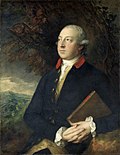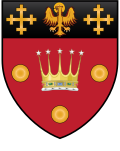Portal:University of Oxford
| Main page | Indices | Projects |
The University of Oxford portal
The University of Oxford is a collegiate research university in Oxford, England. There is evidence of teaching as early as 1096, making it the oldest university in the English-speaking world and the world's second-oldest university in continuous operation. It grew rapidly from 1167, when Henry II banned English students from attending the University of Paris. After disputes between students and Oxford townsfolk in 1209, some academics fled north-east to Cambridge where they established what became the University of Cambridge. The two English ancient universities share many common features and are jointly referred to as Oxbridge.
The University of Oxford is made up of thirty-nine semi-autonomous constituent colleges, four permanent private halls, and a range of academic departments which are organised into four divisions. Each college is a self-governing institution within the university, controlling its own membership and having its own internal structure and activities. All students are members of a college. Traditionally, each of Oxford's constituent colleges is associated with another of the colleges in the University of Cambridge, with the only exceptional addition of Trinity College, Dublin. It does not have a main campus, and its buildings and facilities are scattered throughout the city centre. Undergraduate teaching at Oxford consists of lectures, small-group tutorials at the colleges and halls, seminars, laboratory work and occasionally further tutorials provided by the central university faculties and departments. Postgraduate teaching is provided in a predominantly centralised fashion.
Oxford operates the Ashmolean Museum, the world's oldest university museum; Oxford University Press, the largest university press in the world; and the largest academic library system nationwide. In the fiscal year ending 31 July 2023, the university had a total consolidated income of £2.92 billion, of which £789 million was from research grants and contracts.
Oxford has educated a wide range of notable alumni, including 30 prime ministers of the United Kingdom and many heads of state and government around the world. 73 Nobel Prize laureates, 4 Fields Medalists, and 6 Turing Award winners have matriculated, worked, or held visiting fellowships at the University of Oxford, while its alumni have won 160 Olympic medals. Oxford is the home of numerous scholarships, including the Rhodes Scholarship, one of the oldest international graduate scholarship programmes. (Full article...)
Selected article
The Registrar of the University of Oxford is one of the university's senior officials, acting (in the words of the university's statutes) as the "head of the central administrative services", with responsibility for "the management and professional development of their staff and for the development of other administrative support". The workload of the role, which has a 550-year history, has increased over time. In the 16th century, it was regarded as a lucrative position and one registrar reacted violently when the university voted to remove him from office for failing to carry out his duties for a year, leading to his temporary imprisonment. A commission headed by former Prime Minister H. H. Asquith recommended in 1922 that Oxford should improve its administration and that the registrar should become a more significant figure. As the historian Brian Harrison put it, Oxford's administration was "edging... slowly from decentralized amateurism towards centralized professionalism." The growth in Oxford's administration led to a move in 1968 to purpose-built accommodation in Wellington Square (pictured): until that time, the administration had been housed in the Clarendon Building in the centre of Oxford. About 4,000 of the university's staff of approximately 8,000 are under the Registrar's control. (Full article...)
Selected biography
Thomas Pennant (1726–1798) was a Welsh naturalist, traveller, writer and antiquarian. He was born and lived his whole life at his family estate, Downing Hall. In 1744 he entered The Queen's College, Oxford, later moving to Oriel College. Like many students from a wealthy background, he left Oxford without taking a degree, although in 1771 his work as a zoologist was recognised with an honorary degree. As a naturalist he had a great curiosity, observing the geography, geology, plants, animals, birds, reptiles, amphibians and fish around him. He wrote acclaimed books including British Zoology, the History of Quadrupeds, Arctic Zoology and Indian Zoology although he never travelled further than continental Europe. He knew many of the scientific figures of his day. His books influenced the writings of Samuel Johnson. He visited and wrote about Scotland and other parts of Britain. Many of his travels took him to places that were little known to the British public and his travelogues, accompanied by colour plates, were much appreciated. He was an amiable man with a large circle of friends and was still busily following his interests into his sixties. (Full article...)
Selected college or hall
St Stephen's House is a theological college and one of the Permanent Private Halls (PPHs) of the University of Oxford. Unlike the colleges, which are run by their Fellows, PPHs are run by an outside institution – in the case of St Stephen's, the Church of England. It was founded in 1876 by Edward King, Bishop of Lincoln and one of the leading figures in the Tractarian movement, and became a PPH in 2003. It was originally located in the centre of Oxford on the site where the New Bodleian Library now stands, but moved soon afterwards to North Oxford. In 1980, it acquired a site in Iffley Road, East Oxford, that had been vacated by the Society of St. John the Evangelist. The current buildings contain the church of St John the Evangelist, designed by G F Bodley; accommodation is provided on site for married and single students. Part of the Anglo-Catholic tradition of the Church of England, it trains candidates for ordination and accepts other students for qualifications in Theology or Education. Alumni include David Hope (Archbishop of York), Glyn Simon (Archbishop of Wales), Jeffrey John (Dean of St Alban's) and Trevor Mwamba (Bishop of Botswana). (Full article...)
Selected image

Did you know
Articles from Wikipedia's "Did You Know" archives about the university and people associated with it:
- ... that it was the British geologist Joseph Prestwich (bust pictured) who confirmed the findings of Boucher de Perthes?
- ... that a Regius Professor of Civil Law was elected to parliament, gaoled, exiled, re-elected, kidnapped, put in the Tower, tortured, hanged, drawn and quartered, then beatified?
- ... that Mike Woodin was the Principal Speaker of the Green Party of England and Wales for six years and a city councillor for Oxford for 10 years?
- ... that A.W. Lawrence, the former Professor of Classical Archaeology at Cambridge University, was the brother of "Lawrence of Arabia"?
- ... that the winners of the university's Gaisford Prize for Greek Verse include the fictional Duke of Dorset in Max Beerbohm's 1911 novel Zuleika Dobson?
Selected quotation
Selected panorama
Wikimedia
The following Wikimedia Foundation sister projects provide more on this subject:
-
Commons
Free media repository -
Wikibooks
Free textbooks and manuals -
Wikidata
Free knowledge base -
Wikinews
Free-content news -
Wikiquote
Collection of quotations -
Wikisource
Free-content library -
Wikiversity
Free learning tools -
Wikivoyage
Free travel guide -
Wiktionary
Dictionary and thesaurus















